The Library of Spanking Fiction: Wellred Weekly
|
||||||
|
Articles
Items of interest regarding all things spanking
|
||||||
|
|
Corporal Punishment in Schoolboy Fiction (cont.) If there were a prize for the most references to corporal punishment in a boys school story Ernest Raymond's rather long-winded but amusing account of school and war called Tell England would be in the running. The school is Kensingtowe, "the finest school in England". Rupert Ray, our hero is caned by his hero, Mr Radley for some minor offence then later that day soundly thrashed again for altering the classroom clock. Soon afterwards he gets ten of the best for alleged impertinence from his housemaster. He strongly disapproves of his housemaster because the poor chap wears "carpet slippers" and only canes them feebly unlike good old Mr Radley who knows how to administer a good hard caning. I strongly suspect the hero of this tale has flagellant tendencies. Ray's best pal Doe (interesting choice of name) is another chap who enjoys a good beating. Especially from the athletic Mr Radley: "Do you know I think I love Radley better than anyone else in the world. I simply loved being whacked by him." Mr Radley, after awarding an extra hard caning to the pair says: "You are two plucky boys." They are indeed plucky boys and the story has a 'ripping yarns' feel to it. Kensingtowe with all that whacking on both hands and bottoms is obviously training its boys to help run the Empire and fight a war that will shortly consume so many young lives. I won't tell you what happens when the two chaps go off and fight in what we now call the First World War but what the boys' Colonel tells them on the eve of battle is well worth repeating. It reads like something General Melchett might have said in the last ever episode of Blackadder. "You've timed your lives wonderfully my boys. To be eighteen in 1914 is the best thing in England. England's wealth used to consist in other things. Nowadays you boys are the richest things she has got. Eighteen years ago you were born for this day. Through the last eighteen years you have been educated for it. Your birth and breeding were given you that you may officer England's youth in this hour." Tell England possesses an idealism and innocence which sounds strange to us ninety odd years after it was published. However, such idealism was common enough in the boys' school stories of the early twentieth century if you were to read any of the boys' periodicals from that time. In storypapers, such as The Captain and Chums, you would find a rich vein of jingoistic patriotism. Doubtless you would find many well-described thrashings as well. It was as if the boys needed to be toughened up for the Empire. However it seems no one at that time had read Rousseau. There is no hint (with the possible exception of the above mentioned Doe and Ray) that either master or boys enjoyed the beatings. It was all terribly innocent. 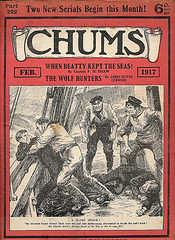 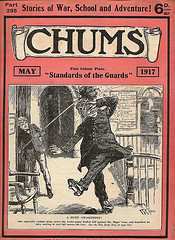 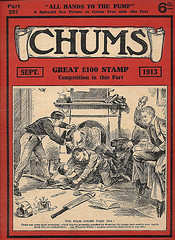 Innocence also permeates through another one of my favourite school stories, Hammond's Hard Lines by the strangely named Skelton Kuppord (a pseudonym for Sir John Adams) which was published in 1894. It is one of the few school stories which is also a fairy tale and concerns the fate of young Tom Hammond locked in the punishment cell by his headmaster and granted three wishes by a passing fairy. What I love about the book is its humour but it has no shortage of references to caning. "I need not go into the details of what followed. But if I had been one of the directors of the company with which Doctor Ackroyd's life was insured, I would have been very anxious for a little while. Indeed, I think life assurance companies would be wise if they agreed amongst themselves never to pay anything to friends or relatives of fat schoolmasters who die of apoplexy in the act of caning. At the very least they should put fat schoolmasters among those whose lives are called extra hazardous." With the exception of the Charles Hamilton (Frank Richards) stories there is very little mention of women administering punishments to young males. The only book I have found is Kim's Last Whipping. It was published in 1878 in Glasgow, is set in 1860's America and tells the tale of a high spirited boy, Kimball Price, who is the naughtiest boy in the school and frequently caned by his stern young schoolmistress, Miss Pentecost. It is slightly similar in style to Laura Ingalls Wilder's Little House on the Prairie. The characters are all desperately poor but God fearing. It should perhaps be considered more a religious tract than a traditional school story. "She liked Kim - everybody liked him; but that was no reason why he should be allowed to tie girls together by their hair or fire paper balls or stick pins in the benches. Miss Pentecost never winked at naughtiness and as whippings were fashionable at that period she whipped Kim regularly three times a week. It was considered the most direct way of reaching the conscience." Miss Pentecost has a very real affection for the naughtiest boy in her class but that doesn't stop her doing what needs to be done and ensuring all Kim's punishments are as painful as possible. "Next day was time for one of Kim's regular whippings. He had been more trying than usual, and Miss Pentecost sent Bob Whiting out for a remarkably strong birch stick which could express her feelings better than the old one which stood in the corner. She spent some time in trimming the new twig, though she was careful to leave a few little knots on it, which would give emphasis to the blows. 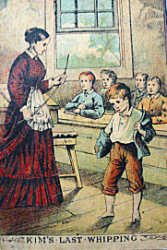 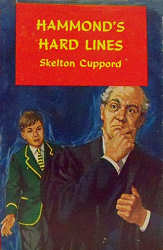 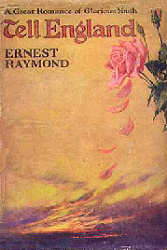 Often, corporal punishment was not described in any detail. It happened off-stage. Sometimes one almost feels the author is slightly embarrassed to have even mentioned it at all. In this day and age it all seems a million miles away but then it was just another part of school life. Maybe even then writers of school fiction scented something vaguely disturbing in boys being beaten. It wasn't as if it was a quick clip round the ear. It was a ritualised and very formal event. A boy would usually bend over a desk or a chair and a set number of strokes would be given with a cane or slipper, often long after the original offence. In much school fiction corporal punishment seems to be considered as something to toughen boys with, as if to mould character. The school spirit was very much in evidence in a turn of the century work, Rudyard Kiplings' Stalky and Co, where the headmaster thrashes the boys for no offence at all. The boys admire him all the more because of it and when later he canes the entire school he receives a great ovation, "the boys awaiting their turn cheered and flung themselves upon him to shake hands." Authors did at least attempt to reflect some of the realities of a schoolboy's existence at that time. In real life few boys could have escaped being subjected to corporal punishment at some time or other if they went to a traditional English boarding school. Such schools were full of snobbery, bullying, lack of privacy and dreadful food. Beatings were seen as good for a boy's moral character. If you could take your punishment without fuss you would be admired and the slate would be wiped clean. Of course fiction being fiction, some of the more uncomfortable sides of school life were often omitted, although books such as Alec Waugh's Loom of Youth did attempt to show the darker side (and very little thanks did he ever receive for it). As one good friend of mine said of his own boarding school days: survive that and you can survive anything! For anyone wishing to find out more about schoolboy fiction may I suggest they buy a copy of Robert J. Kirkpatrick's excellent Encyclopedia of Boy's School Stories published by Ashgate Publishing. And if you are browsing second-hand bookshops look out for old copies of The Captain and The Chums which shouldn't cost a lot and contains lots of school stories, some of them pretty dreadful but others well worth reading. 23 comments
|
|||||
| Pages: 1 2 3 4 5 6 7 8 9 10 11 12 13 14 15 16 | ||||||


